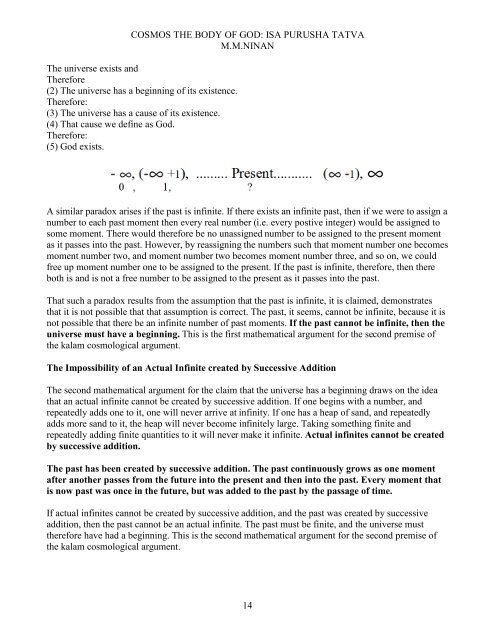You also want an ePaper? Increase the reach of your titles
YUMPU automatically turns print PDFs into web optimized ePapers that Google loves.
COSMOS THE BODY OF GOD: ISA PURUSHA TATVA<br />
M.M.NINAN<br />
The universe exists and<br />
Therefore<br />
(2) The universe has a beginning <strong>of</strong> its existence.<br />
Therefore:<br />
(3) The universe has a cause <strong>of</strong> its existence.<br />
(4) That cause we define as <strong>God</strong>.<br />
Therefore:<br />
(5) <strong>God</strong> exists.<br />
A similar paradox arises if the past is infinite. If there exists an infinite past, then if we were to assign a<br />
number to each past moment then every real number (i.e. every postive integer) would be assigned to<br />
some moment. There would therefore be no unassigned number to be assigned to the present moment<br />
as it passes into the past. However, by reassigning the numbers such that moment number one becomes<br />
moment number two, and moment number two becomes moment number three, and so on, we could<br />
free up moment number one to be assigned to the present. If the past is infinite, therefore, then there<br />
both is and is not a free number to be assigned to the present as it passes into the past.<br />
That such a paradox results from the assumption that the past is infinite, it is claimed, demonstrates<br />
that it is not possible that that assumption is correct. The past, it seems, cannot be infinite, because it is<br />
not possible that there be an infinite number <strong>of</strong> past moments. If the past cannot be infinite, then the<br />
universe must have a beginning. This is the first mathematical argument for the second premise <strong>of</strong><br />
the kalam cosmological argument.<br />
The Impossibility <strong>of</strong> an Actual Infinite created by Successive Addition<br />
The second mathematical argument for the claim that the universe has a beginning draws on the idea<br />
that an actual infinite cannot be created by successive addition. If one begins with a number, and<br />
repeatedly adds one to it, one will never arrive at infinity. If one has a heap <strong>of</strong> sand, and repeatedly<br />
adds more sand to it, the heap will never become infinitely large. Taking something finite and<br />
repeatedly adding finite quantities to it will never make it infinite. Actual infinites cannot be created<br />
by successive addition.<br />
The past has been created by successive addition. The past continuously grows as one moment<br />
after another passes from the future into the present and then into the past. Every moment that<br />
is now past was once in the future, but was added to the past by the passage <strong>of</strong> time.<br />
If actual infinites cannot be created by successive addition, and the past was created by successive<br />
addition, then the past cannot be an actual infinite. The past must be finite, and the universe must<br />
therefore have had a beginning. This is the second mathematical argument for the second premise <strong>of</strong><br />
the kalam cosmological argument.<br />
14


















